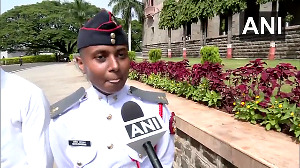 Despite their promised reduction in power prices, the Arvind Kejriwal-led Delhi government may want keep the issue on the back burner for sometime longer, since none of the concerned players are ready to give an inch, and seem raring for a fight, says Upasna Pandey
Despite their promised reduction in power prices, the Arvind Kejriwal-led Delhi government may want keep the issue on the back burner for sometime longer, since none of the concerned players are ready to give an inch, and seem raring for a fight, says Upasna Pandey
The power crisis in Delhi could well be a case of brinkmanship with no player ready to take it past the tipping point and make it ‘inconvenient’ for the people of Delhi, bang in the middle election season.
There are powerful players who are strapped with sufficient gun power and no one is ready to throw in the towel just yet.
The Arvind Kejriwal-led Delhi government can’t back out as reducing power tariff is among its key election promises. Anil Ambani’s Reliance Infrastructure-owned power distribution companies or discoms, Bombay Suburban Electric Supply Rajdhani and BSES Yamuna refuse to budge due to the severe impact on their balance-sheets.
While the power generator, National Thermal Power Corporation cannot be faulted for demanding payment of dues from the two discoms and the Delhi Electricity Regulatory Commission doing what it is mandated to do, there is little room for reaching a middle ground.
The plot is unfolding with BSES Rajdhani and BSES Yamuna, on Thursday moving the Supreme Court against the NTPC's threat to cut their supplies next week over outstanding dues. The issue is listed before the bench headed by Chief Justice P Sathasivam, for an urgent hearing on Friday.
The BSES discoms have also written to the Delhi government, asking for the immediate release of Rs 262 crore of the pending subsidy amount to help them pay the NTPC dues to avoid a likely power regulation crisis.
Both BSES Rajdhani and BSES Yamuna supply power to nearly 70 per cent of the national capital’s 3.4 million consumers in central, eastern, western and southern parts. Together, the two discoms purchase as much as 2,000 Mw, or 60 per cent of their total power requirement, from the NTPC. Tata Power Delhi Distribution Ltd is the other key player which supplies power to around 13 lakh consumers in the north and northwestern parts of the national capital.
It all began when the Delhi government announced 50 per cent subsidy on power consumption up to 400 units on the Delhi Electricity Regulatory Commission rates in Delhi on January 1, 2014. Kejriwal also requested the Comptroller and Auditor General of India to order an audit into the finances of the three private power distribution companies in the capital.
He went on to write to DERC, the regulatory body on February 3, to suspend the discoms’ licences. The DERC subsequently issued notices against the discoms on February 4, asking them to appear before it on February 6.
A day before they were scheduled to appear, both filed an application before the tribunal seeking a restraint order. On Wednesday, the Appellate Tribunal for Electricity restrained the DERC from cancelling the licences of power discoms, BSES Yamuna Power Ltd and BSES Rajdhani Power Ltd.
Rediff.com spoke to key stakeholders.
The NTPC says it is a standard practice to issue notices to state electricity boards and distribution companies when they default on payment schedules.
“This has happened last year in Rajasthan and Mizoram and is true for other states as well. We are a commercial player and as soon as the distribution companies pay the dues, we will withdraw the notice in Delhi,” explained a NTPC senior official, speaking on condition of anonymity. They have reasons to be irked by BSES Yamuna and BSES Rajdhani as this is the third time they have run into payment trouble with the NTPC.
There are also reports of the Kejriwal government considering ‘good boy discom’ Tata Power as an alternate, given its positive track record of consistent payment to the NTPC. But experts say any discom would be deterred by the messy financial conditions unless the government takes over past dues estimated to be about Rs15,000 crore.
“At the end of the day, somebody has to foot the bill, for the power generation, whether it is by infusing funds or incremental raise in tariffs. Also, the NTPC may look at selling power in open market, but this may not viable in the long run as it requires long term power purchase agreements,” said a Tata Power official, on condition of anonymity.
While Kejriwal has been critical of the discoms, on both performance and failure to reduce distribution losses, Tata Power has been consistently praised on performance by the Sheila Dikshit government. Tata Power has reportedly brought AT&C losses down to less than 10 per cent. “The international average is around 6-7 per cent and it will be very difficult to bring this further down in Delhi,” added the Tata official.
Everyone is raring for a fight and no one is willing to give an inch, least of all the Kejriwal-led Aam Aadmi Party government.
“The Delhi government has no direct role in this. We have reminded the DERC of its role and we also apprised the LG of the situation. The discoms have been given a lenient hand so far, starting from prime government land being leased on nominal rates to them for running billing centres, to allowing them to raise power tariff, the most recent one done last week,” said a Delhi government source.
“It is time for them to deliver to the consumer what they pay for,” he added.
The Delhi government may be ready to keep this issue on the burner for sometime longer. In a similar stand-off between NTPC and discoms in 2011, Sheila Dixit led Cong government infused funds as equity in the debt-ridden BSES companies to enable them to get bank loans.
“ There is no question of allocating funds by the government or passing the tariff burden to the end customer in Delhi, however, we can assure that people of Delhi will not be put through any inconvenience,” were the final remarks from the Delhi government source.
Clearly, with no decisive backup plan, the Delhi government is finding it tough to finance their promised and announced tariff reduction. They know that the NTPC can’t really pull the plug on Delhi but also know that this situation is not sustainable as Delhi gets into another long summer of high power demand set to touch 6,000 MW, according to the power department. The peak demand last summer was 5,653MW per day.
It may be sometime before the dust settles on this high-voltage crisis, but one thing is clear, no one wants to cause inconvenience to those who live in a “power” capital.










